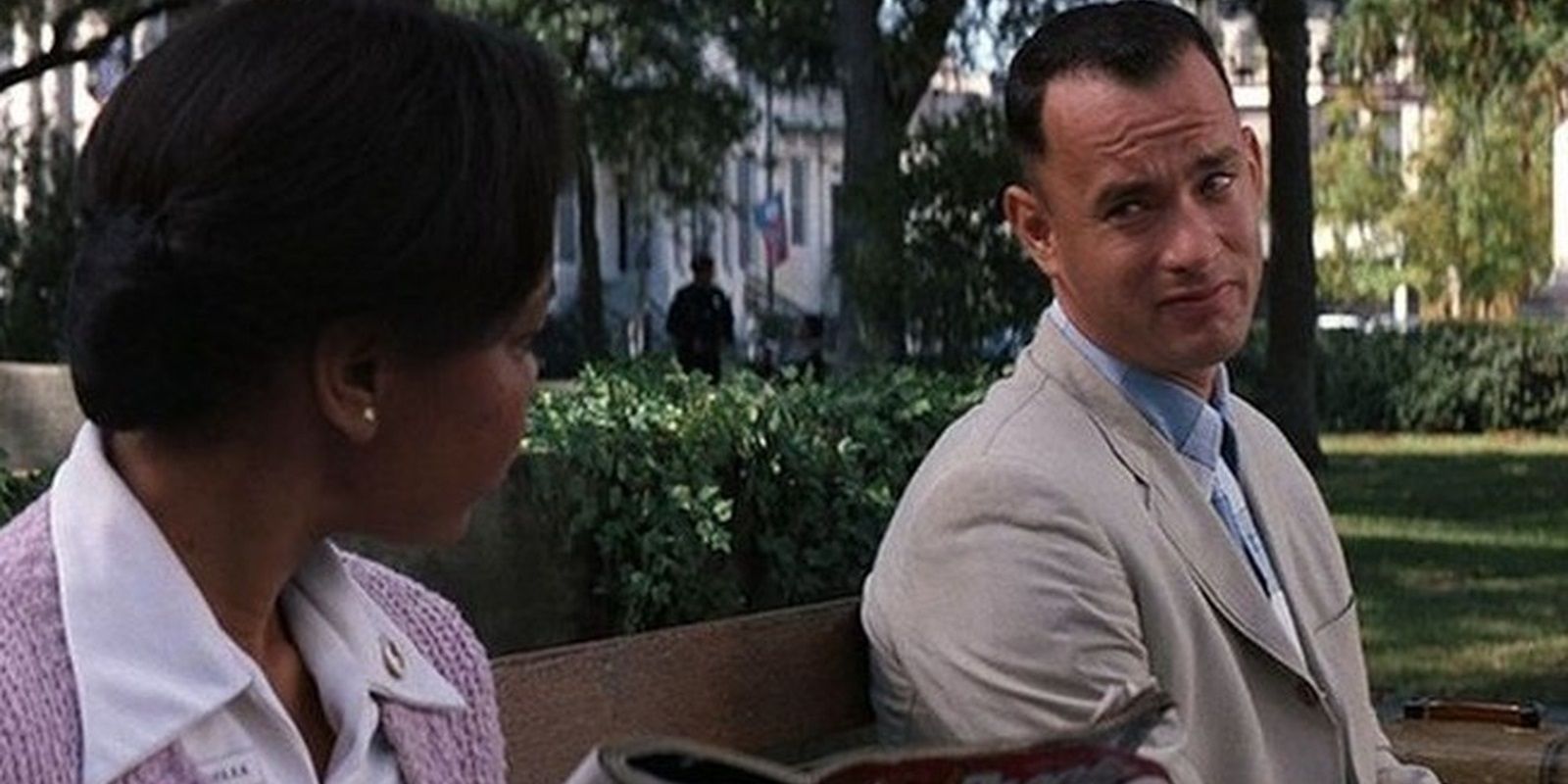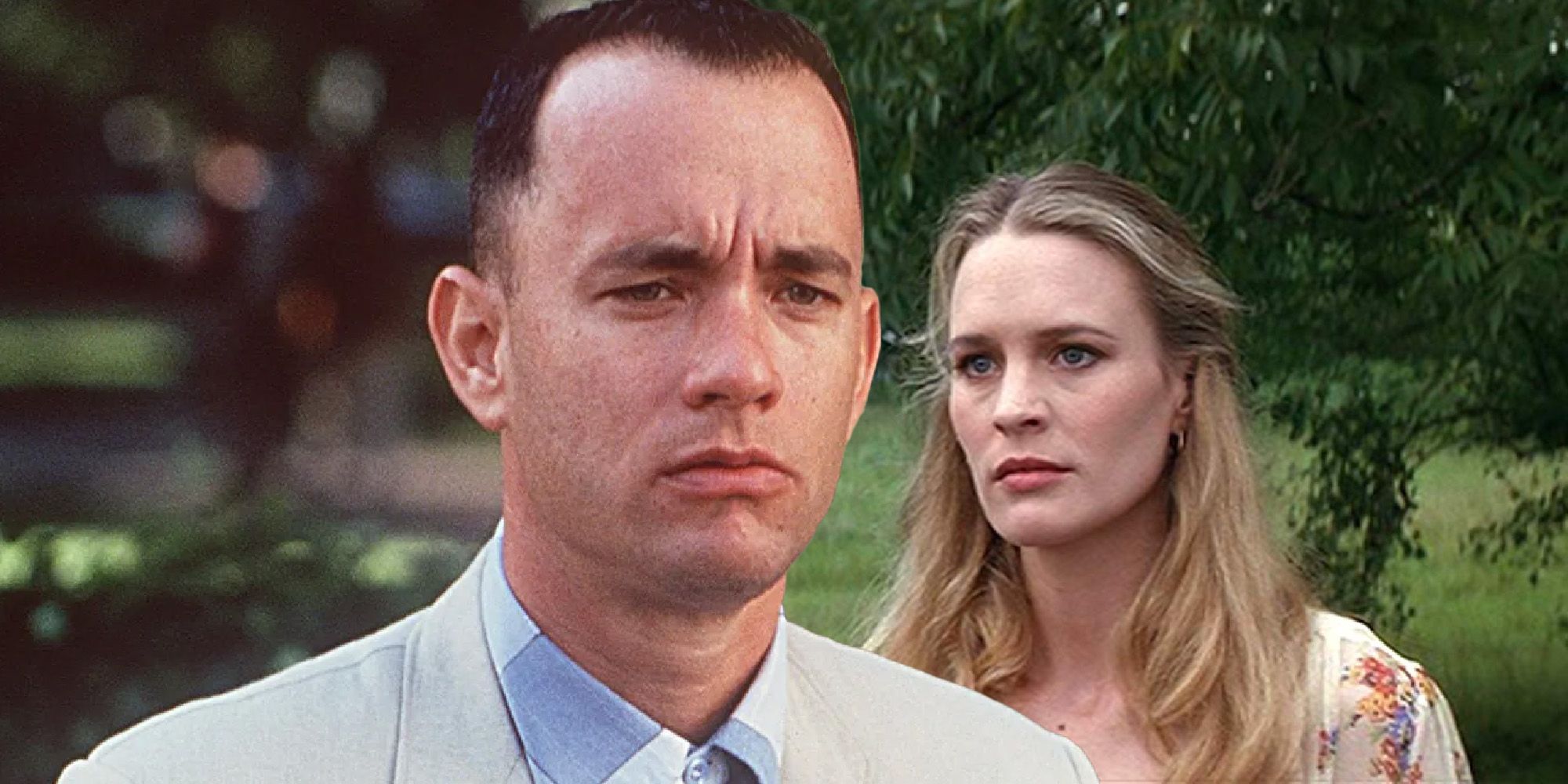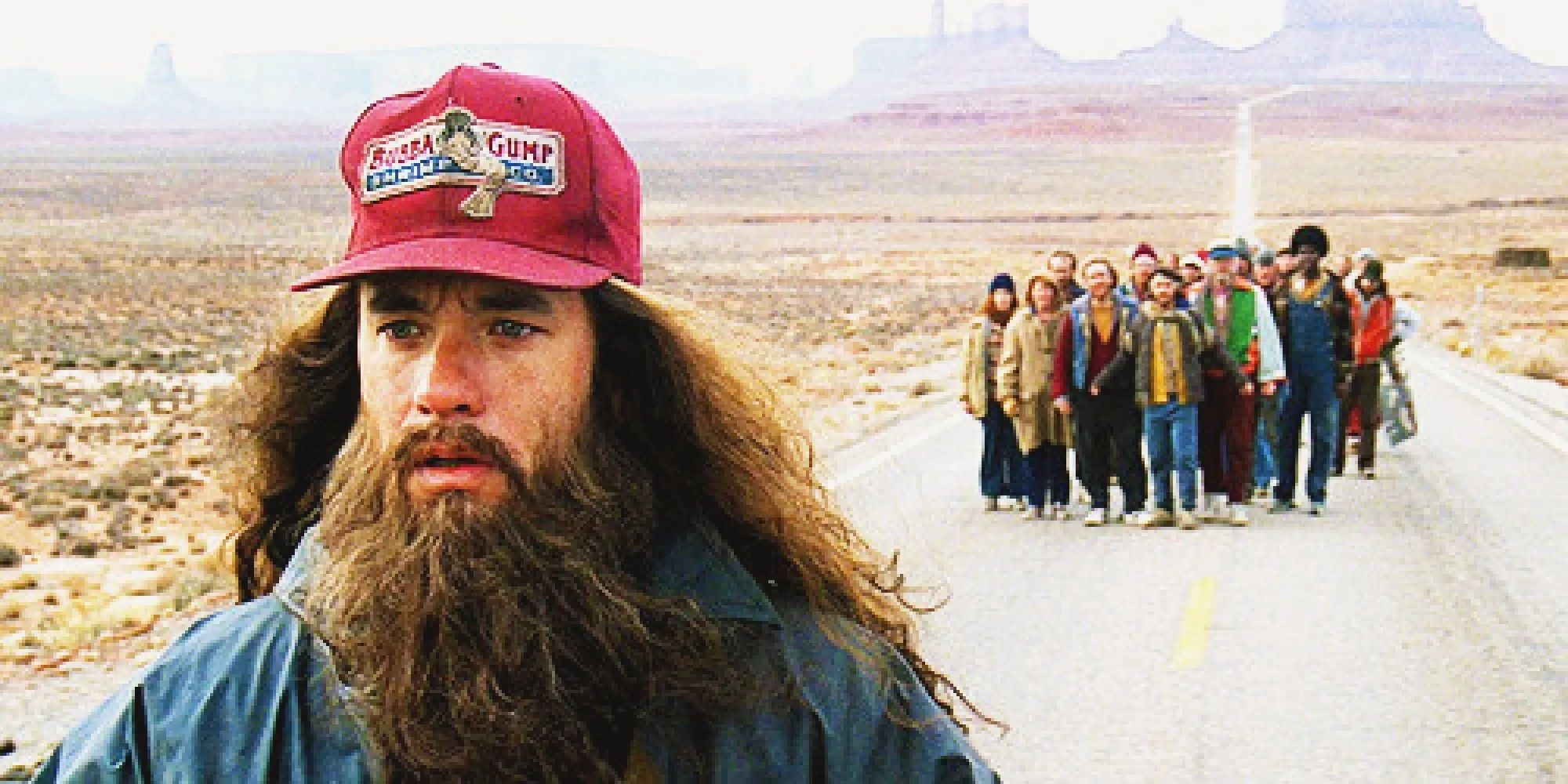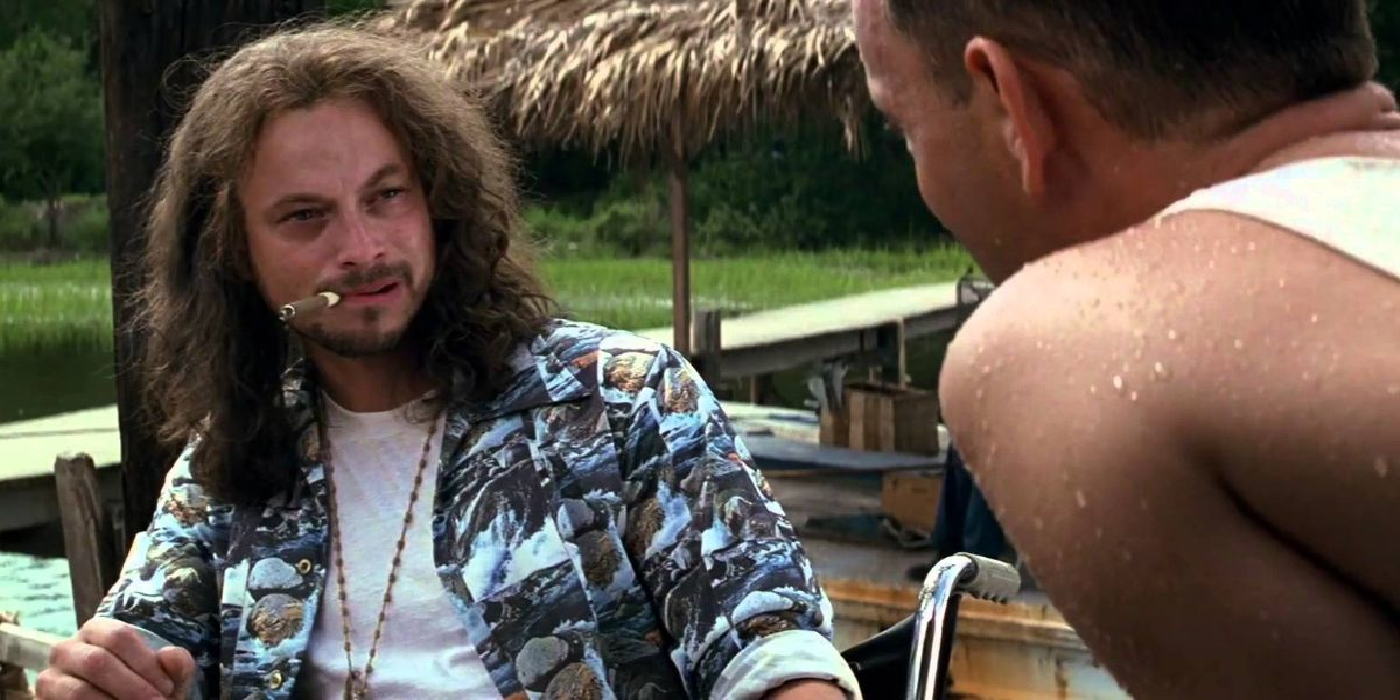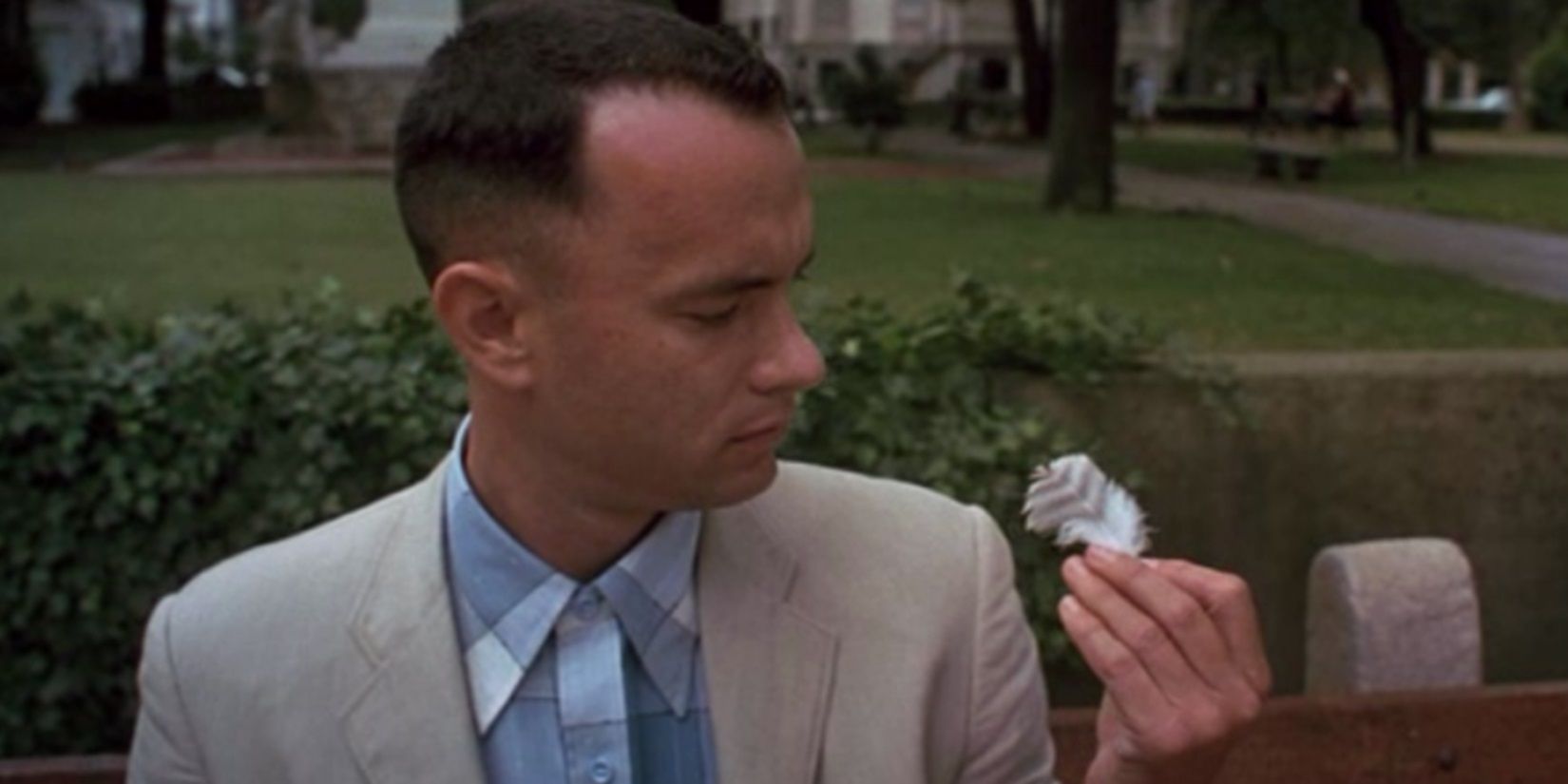The ending of Forrest Gump is almost a perfect mirror of the beginning as a feather flies away from Forrest Gump sitting at a bus stop, representing the cyclical nature of life. The 1994 Robert Zemeckis-directed movie is famous for its earnest lead character and endlessly quotable dialogue. Forrest Gump was nominated for 13 Academy Awards, winning six categories, including Best Picture, Best Actor for Tom Hanks, Best Director, Best Adapted Screenplay, Best Film Editing, and Best Visual Effects
Forrest Gump, adapted from a 1986 novel of the same name by Winston Groom, tells the unbelievable larger-than-life story of the fictional character, Forrest Gump (Tom Hanks). Gump is “slow-witted,” but his “mama” (Sally Field) refuses to let him feel like he’s different from anybody else. At a young age, Forrest discovers he’s an incredibly fast runner with seemingly endless endurance, which leads him to become a college football star, a war hero, and a national media sensation, but all he ever wants is to be with his childhood sweetheart, Jenny (Robin Wright).
The Meaning Behind Forrest Gump’s Final Scene Explained
The last scene of Forrest Gump follows Forrest and his and Jenny’s son, Forrest Jr., as they wait for the bus to take the young boy to school. When the bus approaches, Forrest notices Curious George, a book his mother used to read to him, in Forrest Jr.’s backpack. His son explains he’s bringing it for show-and-tell in his class. While perusing through the pages, the feather that Forrest previously stuffed inside falls out and into his lap. It later floats away after Forrest Jr. leaves on his bus, and the movie comes to an end.
The feather at the end of
Forrest Gump
is a metaphor for Forrest’s destiny as it floats away from him.
The feather is the most significant part of Forrest Gump‘s final scene as it symbolizes Tom Hanks’ character’s destiny, which is a persistent theme throughout the 1994 film. Most of Forrest Gump‘s iconic quotes relate to destiny, including “Life is like a box of chocolates. You never know what you’re gonna get.” But the most significant line about destiny came when Forrest visited Jenny’s grave. He said, “I don’t know if we each have a destiny, or if we’re all just floating around accidental-like on a breeze. But I think maybe it’s both. Maybe both is happening at the same time.”
The feather at the end of Forrest Gump is a metaphor for Forrest’s destiny as it floats away from him. Perhaps its leaving symbolizes that Forrest has finally found his destiny, which is being a father, but it floating away also signals that someone’s destiny is circumstantial. So, as Forrest told Jenny, it’s a little bit of both. Whatever the case, meeting his son and getting to raise him was evidently always where Forrest was meant to end up in Forrest Gump.
Forrest Gump is an Unreliable Narrator… Sort Of
When Forrest first begins telling his story at the bus stop, it’s immediately clear his version of events isn’t always a literal depiction of what actually happened, although it is truthful to his simpler perspective. While Forrest’s narration deviates from the way someone like Jenny or Lieutenant Dan would have narrated the story, the events on screen are always a literal representation of what was truly happening, creating an intentional discordance with Forrest’s perspective.
From Forrest describing his leg braces as “magic shoes” to saying “I got to see a lot of the countryside” when describing Vietnam, there’s a total lack of cynicism to Forrest’s worldview. When faced with his biggest tragedies and outright traumatic events, such as the death of Bubba in Vietnam, Forrest, all of which the audience can plainly see on the screen, Forrest simply says “that’s all I have to say about that.” When Jenny asks him if he was scared in Vietnam, he says yes, then recalls how beautiful the stars were and recounts other similar moments of beauty he’d experienced other times in his life.
Why Did Jenny Keep Leaving Forrest?
Forrest’s journey is marked by Jenny coming in and out of his life again and again. As a child she was abused by her father and prayed she’d turn into a bird so she could fly far, far away. After leaving Greenbow, she continues trying to fly away no matter where she is. When Forrest says she should go back to Greenbow, Jenny says “we have very different lives, you know.” To Forrest, the most idyllic thing in the world would be growing old in Greenbow with Jenny, but for Jenny, Greenbow is only a source of trauma and grief. By extension, that time in her life will always be associated with Forrest.
At the end of Forrest Gump, Jenny tells Forrest “I want to apologize to anything I ever did to you, because, I was messed up for a long time.” It wasn’t until Jenny finally put the past behind her that she was able to settle down with Forrest. After Jenny dies from AIDS, Forrest may have finally understood this to some extent because he had her father’s old house torn down.
Why Did Forrest Run?
“Run, Forrest, run” might be the most famous line from the highly quotable Forrest Gump, and the reason Forrest starts running as a kid is fairly obvious, but why does he go on his multiple-cross-country run later in his life? Running is how Forrest moves from one time in his life to the next, and it’s usually because of Jenny. She tells him to run from the bullies as a kid, which eventually leads to him getting a football scholarship. She also told him to run from danger in Vietnam, which ended up saving almost his entire unit and earned him the Medal of Honor.
After his mother dies and Jenny goes out of his life again, Forrest starts running again and doesn’t stop for “three years, two months, 14 days, and 16 hours.” He says he started (and kept on) running “for not particular reason at all,” although that’s a phrase he uses many times throughout the movie for things that most certainly have reasons, they’re just not reasons he understands, such as the assassinations of JFK and John Lennon.
While running, Forrest thinks about Mama, Bubba, Lieutenant Dan, and mostly Jenny. He doesn’t realize it, but he’s likely doing a lot of emotional processing. He’d experienced traumatic events in Vietnam, Mama died, and he didn’t understand why Jenny kept leaving. At the end of his run he says “My mama always said ‘you got to put the past behind you before you can move on.’ And I think that’s what my running was all about.” Eventually, he says he’s tired and stops, but after running so long it’s more likely he had run out of things to think about than it is that he ran out of energy.
What Happened to Lieutenant Dan?
Lieutenant Dan thought he had a destiny to die in battle like all his ancestors until Forrest rescued him. Despite Forrest saving his life, Lieutenant Dan blames him for ruining his destiny, which he thought meant dying on the battlefield. He thought he understood the purpose of his life, but now he was still alive and also missing his legs. Lieutenant Dan doesn’t just struggle with Forrest, but with God, mockingly asking Forrest if he’s “found Jesus.” Eventually, Lieutenant Dan seems to find God in the storm, after which he seems to be at peace and actually thanks Forrest for saving his life.
Forrest leaves the Bubba Gump Shrimp Company in Lieutenant Dan’s hands to home when he hears his mother is dying, which turns out to be a good decision because Lieutenant Dan makes some sound financial decisions with the company, most notably investing early in Apple stock, making them “gazillionaires.” By the end of Forrest Gump, Lieutenant Dan gets prosthetic legs and marries a Vietnamese woman named Susan, showing he’s happy with his life and excited for the future, even if it’s not the destiny he once thought he was supposed to have.
The Feather and Forrest Gump’s True Meaning Explained
The meaning of the feather is best explained with Forrest’s favorite quote from his mom: “Life is like a box of chocolates. You never know what you’re gonna get.” The feather marks a loop from the opening of the movie where it floats to land on Forrest’s sneaker at the bus stop, to the end where he’s sitting at a different bus stop and drops it on his foot again and it takes off. During that time, Forrest found and lost Jenny again and learned he was a father. He also recounted his entire journey to the other people waiting for the bus.
In many ways, Forrest is a feather blown by the wind. He has so little autonomy over where he goes or why as life sweeps him up in one adventure after another for seemingly, as Forrest would say “no particular reason at all,” yet he’s also always making important decisions that shape his destiny and the destiny of those around him, which is often simple advice given to him by his mother, Bubby, Lieutenant Dan, or Jenny. Forrest’s life isn’t easy, but his lack of cynicism prevents him from being knocked down the way other characters are. His success isn’t due to ambition, but it’s also not pure happenstance.
Jenny or Lieutenant Dan’s perspectives of the story would be very different. Lieutenant Dan thought he had a fixed destiny and Jenny prayed to turn into a bird so she could fly away, although both characters are like a feather blowing in the wind until they choose to accept the friendship and love of Forrest. In the end, Lieutenant Dan has new legs, and as Forrest walks away from Jenny’s grave a flock of birds flies off. Forrest says he doesn’t know if we all have a destiny or “we’re all just floating around accidentally like on a breeze.” He says “maybe it’s both.” Real life may not be that simple, but it makes sense from Forrest’s perspective.
